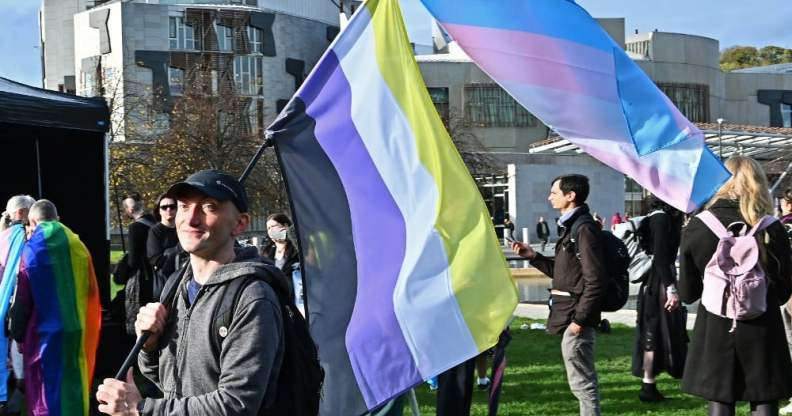Scottish trans protesters send ‘powerful and hopeful message’ ahead of GRA reform vote

Protest outside Holyrood as the Scottish parliament debated GRA reform (Getty Images)
LGBTQ+ advocates have urged politicians to support a bill that would reform Scotland’s “intrusive” gender recognition process at its first Holyrood vote.
MSPs from across the chamber have debated the Gender Recognition Report (Scotland) bill Thursday (27 October), voting for the first time on the bill later in the day.
The bill aims to speed up the time it takes to obtain a gender recognition certificate (GRC) for trans people in Scotland. A GRC is needed for trans people in the UK to amend their birth certificate and change their legal sex and is done so through the Gender Recognition Act (GRA).
The bill would remove the medical requirement and panel system, which can take years, with long waiting times at NHS gender clinics. Instead, trans people will be able to self-identify and be required to live in their acquired gender for three months – instead of two years under current guidelines – before obtaining a GRC.
It would also mean applications would be handled by the registrar general for Scotland and lower the age for obtaining a GRC from 18 to 16.
The bill is expected to easily pass its first stage vote as it has support from people across Scottish politics. The Scottish National Party, Scottish Greens, Scottish LibDems and Scottish Labour all committed to reforming the GRA in their manifestos for the 2021 parliament elections.
Campaigners held demonstration
Vic Valentine, manager of Scottish Trans, part of a demonstration that took place during the debate, says they hope it sends a “powerful and hopeful message” to MSPs about the positive impact this bill will have on the lives of trans people in the country.
“A vote for this bill is a vote to improve the lives of trans men and women across Scotland,” Valentine said.
“The current law means that people have to go through an intrusive, complex and stressful process to update the sex on their birth certificate, and be recognised as who they really are.”
Bright skies above the @ScottishTrans rally outside @scotparl ahead of the Stage One vote on the Gender Recognition Reform Bill. Amazing turnout today showing wide ranging public support for the bill. pic.twitter.com/75l3fUt9kL
— NASUWT Scotland (@NASUWT_Scotland) October 27, 2022
Two young people from LGBT Youth Scotland’s youth commission on trans rights also addressed the crowd, sharing their experiences and views on the bill.
Max said lowering the act of recognition to 16 would mean that young trans people could enter their adult life with legal documents that reflect their authentic self. They also hoped the Scottish government will take steps in the future to include non-binary people in GRA reform in the future as they’re not currently included in the bill.
King, another young person with LGBT Youth Scotland, added that the bill was a good step forward, but said further changes were needed to bring Scottish legislation in line with international best practices, as well as fully meet the needs of the trans community.
https://twitter.com/LGBTYS/status/1585591056736952321
Maggie Chapman, Scottish Greens’ equalities spokesperson, said the bill will be a “watershed moment” and could put Scotland at the “forefront of equality in the UK”, the National reported.
“We will always stand with the LGBTQIA+ community,” Chapman said. “Over recent years there has been a huge and cynical campaign of disinformation and prejudice that has been waged against our trans siblings in particular.”
The proposals will be debated later this afternoon as the Scottish government attempts to pass the much-needed reforms, and a result on the first vote could come just a few hours later.
Thank you to everyone who came along today, and a big thank you to @LGBTIScotland and @ScottishTrans for organising today, there were some really brilliant speakers. #GRAReform pic.twitter.com/bnv9UYlMIl— Unite Scotland LGBT+ Committee (@UniteScotLGBT) October 27, 2022
First minister Nicola Sturgeon has broadly defended the bill and shown her support for the LGBTQ+ community, including trans people.
Harry Potter author JK Rowling wore a shirt declaring her a “destroyer of women’s rights”, but Sturgeon expertly countered the move by defending the bill amid claims from gender-critical voices that it would take away rights from women.
“The gender recognition bill which comes before the Scottish parliament in a couple of weeks’ time is about reforming an existing process,” Sturgeon said.
“It doesn’t give any more rights to trans people, and it doesn’t take any more rights away from women.”
She later explained that the current gender recognition process is “stigmatising” and “traumatic” for trans people.
“It’s asking people to effectively prove that they’re mentally unwell,” Sturgeon said. “So a trans person who wants to [legally] change their gender, the process that’s set out in that bill is one that is less traumatic, and less stigmatising.”

